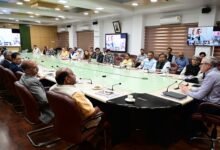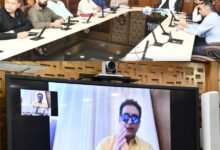
Srinagar, Nov 11: Chief Minister Omar Abdullah Friday said that the recently passed resolution seeking the restoration of the J&K’s special status was not a compromise but a vital step toward reopening dialogue with the Centre.
Speaking during the Motion of Thanks on the Lieutenant Governor’s address, Abdullah described the first session of the Union Territory Assembly as “historic,” noting that the resolution had provided the people with a window of hope.
“This resolution is a symbol of the people’s voice and determination,” Omar said, emphasizing that it reflects the will of Jammu and Kashmir’s citizens and keeps the dialogue with the Centre alive for future engagement. He recalled his detention at Hari Niwas on August 4, 2019, just before the abrogation of Article 370 and 35A, as an “ordeal,” adding, “I am now envisioning our destination, which is very near.”
Reflecting on the state’s lost autonomy, the Chief Minister remarked, “In 2014, Jammu and Kashmir had its own flag, constitution, and distinct identity. Now, nothing is left.” He also acknowledged the dramatic changes in his role, stating, “Things have changed so much since I last addressed this House in 2018 as an opposition member. Now, as the first Chief Minister of the Union Territory, I see how much we’ve lost along the way.”
Abdullah criticised the Bharatiya Janata Party (BJP) for disrupting proceedings from the third day of the session, stating, “BJP is abandoning its responsibility and holding the government accountable. Their duty was to hold us accountable, yet they walked out of the House.”
He also linked the erosion of Jammu and Kashmir’s financial autonomy to the previous PDP-BJP coalition government, which introduced the Goods and Services Tax (GST), a move he argued laid the groundwork for the events of August 5, 2019. Turning his criticism toward the PDP leadership, including the late Mufti Mohammad Sayeed and Mehbooba Mufti, Omar condemned their 2014 alliance with the BJP, accusing them of compromising Jammu and Kashmir’s autonomy for power.
“Those who now talk about resolutions and raise slogans should reflect inwardly. They sacrificed everything for power,” he asserted.
Defending the National Conference’s resolution, Abdullah addressed the opposition’s criticisms, particularly from the BJP. He explained that the resolution was designed to reflect the will of the people without provoking outright rejection from the central government.
“We chose our words carefully to keep the dialogue open with any future government. This resolution has provided people with a window of hope,” he said.
The Chief Minister also pointed out that the significance of the resolution was highlighted by the Prime Minister’s reference to it in his speeches. “Had the resolution been weak or compromised, the Prime Minister wouldn’t have referred to it. We are focused on the future, and we deliberately avoided language that would restrict our options,” he added.
While expressing skepticism about the current central government’s willingness to engage on the issue, Omar remained hopeful for future change. “We do not have high expectations from the present government, but governments don’t last forever. Tomorrow, the situation will change,” he said.
In a more personal reflection, Omar shared that the resolution had sparked renewed conversations and debates among the people. “People have regained their voice, and they are speaking again. We once felt choked, unable to express our concerns. But this resolution has sparked conversations and debates among the people,” he said.
On social media influence, Omar joked, “Thank God, I write a lot on Twitter but don’t read much of it. I want to assure the people of Jammu and Kashmir that our agenda will be shaped by the people, not by social media users.” He further advised elected representatives not to base policies on “the so-called University of WhatsApp and Facebook,” adding, “Few people actively use these platforms, and those who do often forget about you for years, only to suddenly remember now.”
The Chief Minister also criticized those who initially hailed the resolution as historic but later opposed it. “How can something that was celebrated as historic turn into a compromise within 15 minutes?” he questioned. “Anyone can pass a resolution that the Centre rejects, but this resolution was crafted to open doors, not close them.”
Omar defended the resolution as a rejection of the BJP-led Centre’s decisions from August 5, 2019. “There must be something significant in the resolution if it has drawn such attention from the Home Minister. Their focus on it shows it is not a mere compromise; it is a step toward reopening conversations,” he said, dismissing the criticism as “foolish.”
The Chief Minister also addressed recent criticisms of his visit to Delhi, clarifying, “Some people mocked my recent visit to Delhi, but I went there to get things done that would benefit the public.” He highlighted his meetings with the Union Power Minister, who sanctioned 300 MW of additional electricity for Jammu and Kashmir, which would help alleviate power shortages. “Electricity shortages are a significant issue, with high demand in winter in Kashmir and in summer in Jammu leading to frequent power cuts,” he said, adding that the additional power allocation would greatly assist in mitigating the crisis.
Omar also met with the Union Surface Transport Minister, who promised to announce new projects during an upcoming visit to Jammu and Kashmir and sanctioned additional funds for bridge construction.
On the future of the Assembly, Omar stated, “This Assembly is not the one the people aspire to; it is a stepping stone. This Assembly is the path to the full-fledged Assembly we desire. The Prime Minister has committed to restoring statehood, and I am hopeful that the process will start soon.” The abrogation of Article 370 by the Centre on August 5, 2019, ended Jammu and Kashmir’s special constitutional status and bifurcated the state into two Union Territories.





